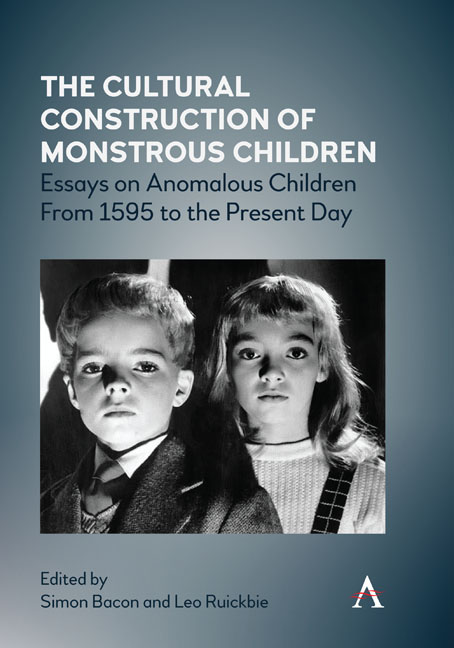 The Cultural Construction of Monstrous Children
The Cultural Construction of Monstrous Children Book contents
- Frontmatter
- Contents
- List of Illustrations
- Acknowledgements
- Introduction
- Part I Historical Case Studies
- Part II Factual Anxiety in Fictional Representations: The Undead Child
- Part III Factual Anxiety in Fictional Representations: The Monstrous Child
- Part IV Cultural Categorization in the Past, Present and Possible Future
- Notes on Contributors
- Index
Chapter Fourteen - Indigo Children: Unexpected Consequences of a Process of Pathologization
Published online by Cambridge University Press: 20 January 2022
- Frontmatter
- Contents
- List of Illustrations
- Acknowledgements
- Introduction
- Part I Historical Case Studies
- Part II Factual Anxiety in Fictional Representations: The Undead Child
- Part III Factual Anxiety in Fictional Representations: The Monstrous Child
- Part IV Cultural Categorization in the Past, Present and Possible Future
- Notes on Contributors
- Index
Summary
Who are The INDIGO Children?
Have they come to save the world?
Or are they the product of wishful imaginations?
Whatever you call them, ‘Indigo's or something else our children are coming into the world with their eyes wide open, ready to play their role in creating a world of compassion and peace. Are we witnessing a major leap in human evolution, what Jean Houston calls ‘Jump Time?’ Many people believe that we are on the brink of a global awakening, and that the Indigo Children are here to show us our highest potential.
[…] The Children are real, and they are changing the world.
Whether you wear rose-colored or indigo-colored glasses, your perception of the world and its workings will be affected. When we prejudge our children as gifted and insightful, that is exactly what we will get, regardless of the reality.
Introduction
In esoteric New Age movements, ‘Indigo Children’ (IC) is a commonly used term for children who – according to the adherents of this concept – feature particular characteristics and talents. The response to this phenomenon has been considerable, first in the United States and then internationally, although it has not become a topic for reputable newspapers or scientific research. A search in the article archives of the leading German print media Der Spiegel and Die Zeit results in only one article in the latter (weekly) newspaper. This is a book review of a novel entitled Indigo, written by the Austrian writer Clemens Setz. An online search in the archives of the New York Times also results in only one article on the topic of IC, written in 2006 on the occasion of the release of the The Indigo Evolution which deals with the ‘Indigo phenomenon’. The most easily available information from an etic (=outsider) perspective is provided by ideologically oriented organizations such as cult information centres, and authors who are aligned or close to sceptic organizations. In the scientific-academic context, only a few studies have been conducted. This chapter will try to give an overview of the genesis as well as the common interpretations of the phenomenon from an ideologically neutral perspective.
- Type
- Chapter
- Information
- The Cultural Construction of Monstrous ChildrenEssays on Anomalous Children from 1595 to the Present Day, pp. 217 - 234Publisher: Anthem PressPrint publication year: 2020


